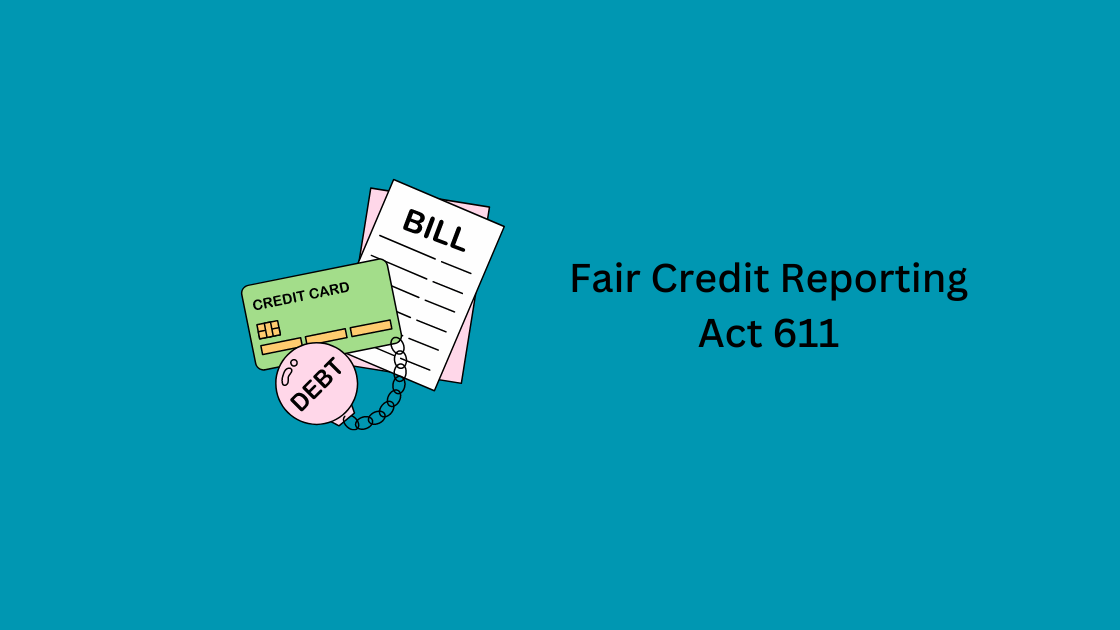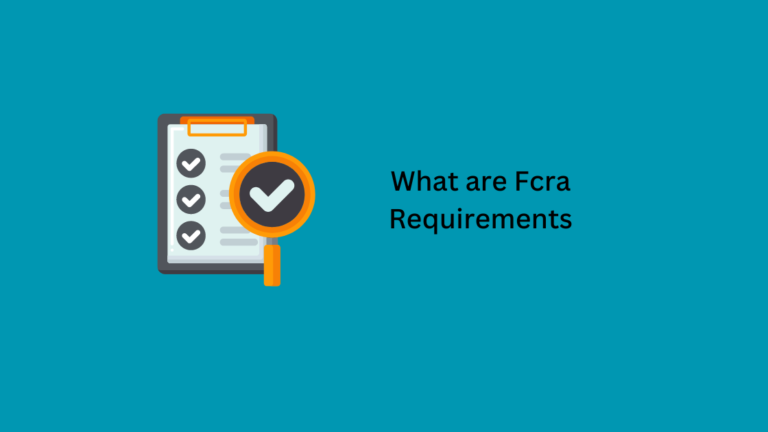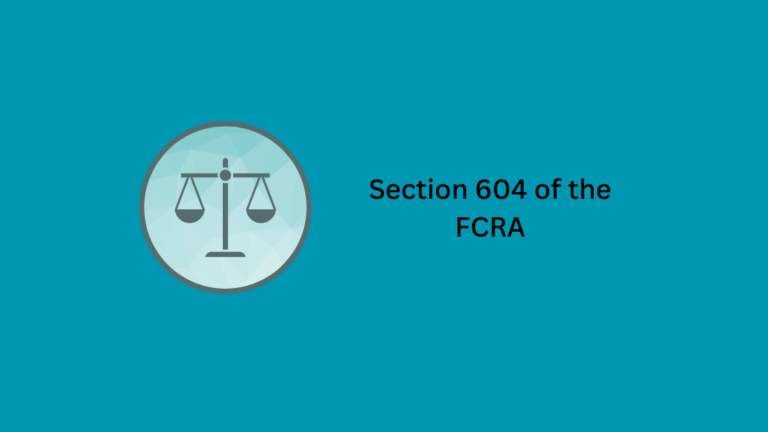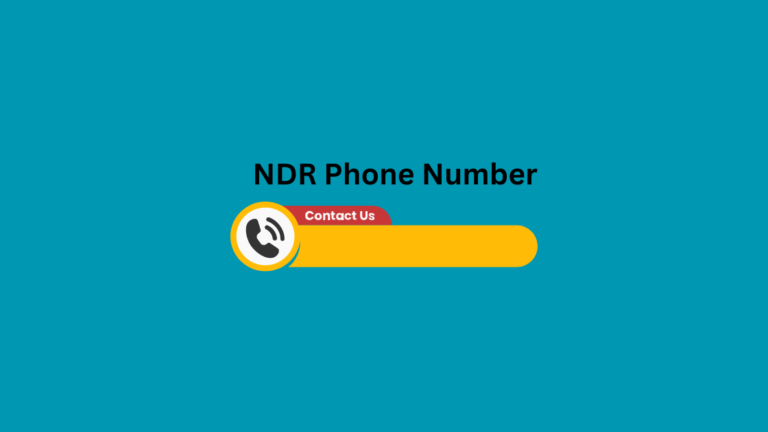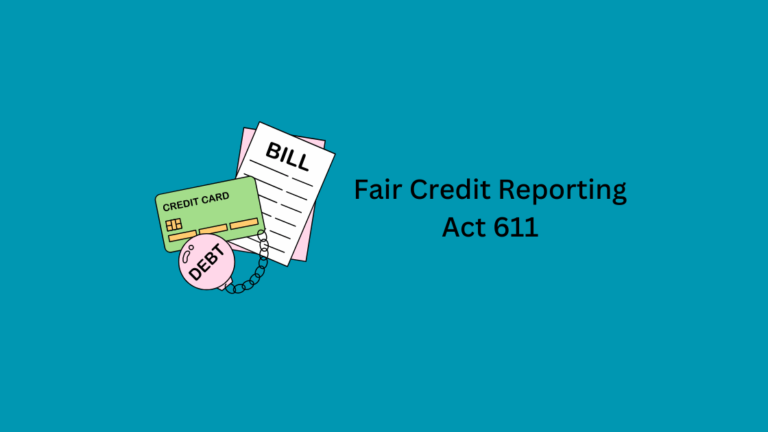Fair Credit Reporting Act 611: Master Your Credit Disputes
The Fair Credit Reporting Act 611 allows consumers to dispute inaccurate or incomplete information on their credit reports. Credit reporting agencies must investigate and correct errors within 30 days.
The Fair Credit Reporting Act (FCRA) Section 611 is crucial for maintaining accurate credit reports. It empowers consumers to challenge any erroneous or incomplete data on their credit reports, ensuring fairness and accuracy. Upon receiving a dispute, credit reporting agencies are legally obligated to investigate and rectify the issues within 30 days.
This process helps protect consumers from potential financial harm due to inaccuracies. Understanding your rights under Section 611 can significantly impact your financial health, as it ensures your credit report reflects true and precise information. This knowledge can lead to better credit scores and more favorable financial opportunities.
Introduction To Fcra 611
The Fair Credit Reporting Act (FCRA) protects your credit report. It ensures your report is accurate and fair. Section 611 of the FCRA is crucial. It explains how to dispute incorrect information on your report.
Importance Of Credit Reports
Your credit report impacts many aspects of your life. Lenders use it to decide if you can get a loan. Employers may check it before hiring you. Landlords review it before renting you a home. A good credit report can open doors for you.
- Helps in getting loans
- Affects job prospects
- Influences rental agreements
Overview Of Section 611
Section 611 of the FCRA allows you to challenge errors. You can file a dispute with credit bureaus. They must investigate your claim. Here are the steps involved:
- Identify the error on your credit report.
- Gather evidence to support your claim.
- Submit a dispute to the credit bureau.
- The bureau investigates within 30 days.
- Receive a response with findings.
If the bureau finds an error, they must correct it. They will also inform you of the changes. This process helps keep your credit report accurate and fair.
| Step | Action |
|---|---|
| 1 | Find the error |
| 2 | Gather evidence |
| 3 | File a dispute |
| 4 | Investigation by bureau |
| 5 | Receive response |
Understanding Section 611 empowers you. You can ensure your credit report is correct. This can improve your financial health.

Credit: www.pinterest.com
Rights Under Fcra 611
The Fair Credit Reporting Act (FCRA) Section 611 gives you specific rights. Knowing these rights can help you manage your credit report better. This section explains how you can dispute errors on your credit report.
Dispute Process
Under FCRA 611, you can dispute inaccurate information on your credit report. Follow these steps:
- Write a dispute letter to the credit bureau.
- Include copies of documents that support your claim.
- The credit bureau must investigate your dispute.
Disputes can be submitted online, by mail, or by phone. Make sure to keep a copy of your dispute letter.
Timeframes For Resolution
Once you submit a dispute, the credit bureau has a set timeframe for resolution:
- 30 days to investigate your dispute.
- 45 days if you provide additional information.
If the bureau finds the information is wrong, they must correct it. You will receive a free copy of your updated report.
Understanding your rights helps you maintain a clean credit report.
Preparing To Dispute
Before disputing errors on your credit report, preparation is key. A well-organized approach ensures a higher chance of success. First, gather your credit reports. Then, identify any errors. This guide will help you through each step.
Gathering Your Credit Report
Begin by obtaining your credit reports from the three major bureaus: Equifax, Experian, and TransUnion. Each bureau may have different information.
- Visit creditrepaircloud.com
- Request your free annual credit report from each bureau.
- Download and print your reports for review.
Reviewing reports from all three bureaus helps catch all errors. Sometimes, an error appears on only one report.
Identifying Errors
Carefully review each credit report for inaccuracies. Common errors include:
| Error Type | Description |
|---|---|
| Personal Information | Incorrect name, address, or Social Security number |
| Account Status | Wrong account status, like “closed” instead of “open” |
| Credit Limits | Incorrect credit limit amounts |
| Payment History | Errors in reported payments, such as late payments |
Highlight or mark any errors you find. This will help you when disputing.
Take notes on each error. Include why you believe it is incorrect.
- Compare each item with your records.
- Check for duplicate accounts.
- Ensure all balances are accurate.
Dispute any errors you find to improve your credit score.
Submitting Your Dispute
The Fair Credit Reporting Act (FCRA) Section 611 helps you correct errors on your credit report. Submitting your dispute correctly is crucial for a successful outcome. Follow these steps to ensure your dispute is handled properly.
Writing A Dispute Letter
Your dispute letter should clearly state the inaccuracies on your credit report. It must include your full name, address, and contact information.
Provide a clear description of each error. Reference the specific entries you are disputing.
Here is a simple format for your dispute letter:
Your Name Your Address City, State, ZIP Code Date Credit Reporting Agency Name Agency Address City, State, ZIP Code Subject: Dispute of Inaccurate Information Dear [Credit Reporting Agency], I am writing to dispute the following information on my credit report. The items I am disputing are (list items with details). Please correct this information as soon as possible. Sincerely, [Your Name]
Supporting Documentation
Include copies of documents that support your claim. Do not send originals.
Useful documents could be:
- Bank statements
- Payment records
- Correspondence with creditors
Ensure each document matches the disputed information. Highlight the relevant sections.
By following these steps, you increase the chance of correcting errors on your credit report.
Tracking Your Dispute
Under the Fair Credit Reporting Act (FCRA) Section 611, tracking your credit dispute is crucial. Ensuring accuracy in your credit report can impact your financial health. Let’s explore effective ways to track your dispute.
Communicating With Credit Bureaus
Start by communicating with credit bureaus via certified mail. This ensures a record of your communication. List the errors clearly in your letter. Include copies of relevant documents.
Next, use the contact information for the major credit bureaus:
- Equifax: P.O. Box 740256, Atlanta, GA 30374
- Experian: P.O. Box 4500, Allen, TX 75013
- TransUnion: P.O. Box 2000, Chester, PA 19016
Ensure you use the correct address for each bureau. This helps avoid delays.
Monitoring Progress
Once you submit your dispute, start monitoring progress regularly. Credit bureaus have 30 days to investigate your dispute. They may extend this period by 15 days if you provide additional information.
Here’s a simple table to track the timeline:
| Day | Action |
|---|---|
| 1-5 | Submit your dispute |
| 5-10 | Receive confirmation from bureau |
| 15-30 | Bureau investigates |
| 30-45 | Receive results |
Check the status online through the bureau’s website or customer service.
Keep all communication records, including emails and letters. This can be useful if you need to follow up.
By communicating effectively and monitoring progress, you can ensure a smooth dispute process.

Credit: www.scribd.com
Outcomes Of A Dispute
The Fair Credit Reporting Act (FCRA) gives you rights. One important right is to dispute errors on your credit report. Understanding the outcomes of a dispute can help you know what to expect.
Possible Resolutions
When you dispute an item on your credit report, there are a few possible resolutions:
- Correction: The error is fixed. Your credit report is updated.
- Deletion: The incorrect item is removed from your report.
- Verification: The disputed item is verified as accurate. It remains unchanged.
| Resolution | Description |
|---|---|
| Correction | The error is fixed and your report is updated. |
| Deletion | The incorrect item is removed from your report. |
| Verification | The item is verified as accurate and remains unchanged. |
Next Steps If Dispute Is Denied
If your dispute is denied, don’t lose hope. There are steps you can take:
- Review the Response: Check the reason for denial.
- Gather More Evidence: Collect more proof to support your claim.
- File Another Dispute: Submit a new dispute with additional evidence.
- Contact the Creditor: Reach out to the creditor directly. Discuss the issue.
- Seek Legal Help: Consult a lawyer if needed. They can provide guidance.
Maintaining Healthy Credit
Maintaining healthy credit is crucial for your financial well-being. The Fair Credit Reporting Act (FCRA) Section 611 helps you ensure your credit report is accurate. This guide focuses on monitoring, fixing errors, and preventing future mistakes.
Regular Monitoring
Regularly check your credit report for errors. You can request a free report annually from the major credit bureaus: Experian, TransUnion, and Equifax. Look for incorrect entries, outdated information, or unfamiliar accounts.
Use online tools to track changes in your credit report. Many banks offer free credit score monitoring services. These tools alert you to any sudden changes.
Here’s a simple table to help you track your credit report checks:
| Credit Bureau | Last Checked | Next Check |
|---|---|---|
| Experian | 01/01/2023 | 01/01/2024 |
| TransUnion | 02/01/2023 | 02/01/2024 |
| Equifax | 03/01/2023 | 03/01/2024 |
Preventing Future Errors
Preventing future errors involves several steps. Always verify the information before applying for credit. Ensure your name, address, and social security number are correct.
Keep your financial documents secure. Shred old bank statements and credit card offers. Use strong passwords for online banking and financial accounts.
Here are some quick tips to prevent errors:
- Check your credit report annually
- Verify all personal information
- Secure your financial documents
- Use strong, unique passwords
Taking these steps helps you maintain healthy credit. Stay proactive to protect your financial future.
Legal Support And Resources
The Fair Credit Reporting Act (FCRA) 611 offers various legal protections. Knowing where to find help is crucial. Let’s explore when to seek legal assistance and useful organizations that can provide support.
When To Seek Legal Help
Seek legal help if you experience these issues:
- Your credit report contains errors not corrected.
- You face identity theft or fraud.
- Credit reporting agencies ignore your disputes.
- You suffer from inaccurate or outdated information.
Lawyers can help you understand your rights. They can also represent you in court if needed. Consulting an attorney ensures you take the right steps.
Useful Organizations And Websites
Several organizations provide resources and support:
| Organization | Website | Services |
|---|---|---|
| Consumer Financial Protection Bureau (CFPB) | www.consumerfinance.gov | Guidance and complaint filing |
| Federal Trade Commission (FTC) | www.ftc.gov | Identity theft resources |
| National Consumer Law Center (NCLC) | www.nclc.org | Legal advocacy and publications |
These websites offer valuable information. They help you navigate credit reporting issues effectively.
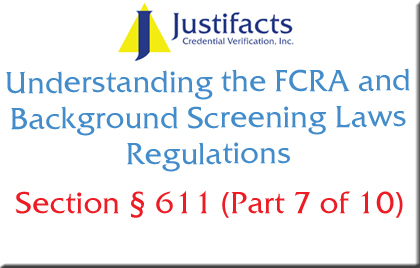
Credit: www.justifacts.com
Frequently Asked Questions
1. What Is Section 611 Of The Federal Fair Credit Reporting Act?
Section 611 of the Federal Fair Credit Reporting Act allows consumers to dispute inaccurate information on their credit reports. This section ensures credit bureaus investigate disputes within 30 days and correct any errors found. It protects consumers’ credit integrity and helps maintain accurate credit reporting.
2. What Is A 611 Letter?
A 611 letter is a formal request to credit bureaus to verify or remove incorrect information from a credit report.
3. What Is The Fair Credit Reporting Act 1681?
The Fair Credit Reporting Act (FCRA) 1681 ensures the accuracy, fairness, and privacy of consumer information in credit reports. It regulates how credit information is collected and used.
4. What Happens If You Break The Fair Credit Reporting Act?
Violating the Fair Credit Reporting Act can lead to fines, legal fees, and damages. Consumers may sue for actual and punitive damages.
Conclusion
Understanding the Fair Credit Reporting Act 611 empowers you to challenge inaccurate credit information. This law protects your financial reputation. By knowing your rights, you can ensure your credit report is accurate. Take control of your financial future and maintain a healthy credit score. Stay informed and proactive in managing your credit.

